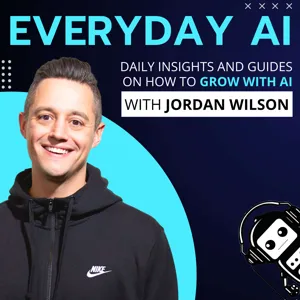We know that AI can help us make more money. But what can it do to help improve the way we manage and deal with money? Today, Nazia Raoof, IT Strategy and Strategic Partnerships for Financial Services, joins us as we delve into the world of banking and financial services and explore how AI can be used to improve these industries.
Newsletter: Sign-up for our free daily newsletter
More on this: Episode Page
More on this topic in today's newsletter
Join the discussion: Ask Nazia and Jordan questions about AI and financial services
Upcoming Episodes: Check out the upcoming Everyday AI Livestream lineup
Website: YourEverydayAI.com
Email The Show: info@youreverydayai.com
Connect with Jordan on LinkedIn
Time Stamps:
[00:00:17] Daily AI news
[00:06:35] ChatGPT as a complementary tool for financial advisors
[00:09:15] Firms adapting to AI and use cases
[00:14:33] Embedding AI in platforms and APIs while adding guardrails
[00:16:47] Generative AI's risk for financial institutions' security
[00:19:53] Final takeaway
Topics Covered in This Episode:
- Risks posed to financial institutions and how banks handle AI
- Implementation of AI governance committee
- Functions of the committee in evaluating and implementing AI
- Understanding of decision makers in the financial industry regarding generative AI
- Extracting information from PDFs and spreadsheets using generative AI
- Importance of adapting to using bots in the financial industry
- Personalized advice and financial education offered by bots
- Use of bots in websites for loan assistance and account support
- Guideline establishment and embracing the use of bots by banks
- Use of embedded AI and chat GPT in platforms APIs and partnerships
- Focus on implementing guardrails to protect against data breaches
- Accuracy and limitations of ChatGPT requiring fact-checking
- Risk of younger generations relying on AI-generated code without understanding its quality
- JPMorgan's use of ChatGPT and AI in production
- Development of JPMorgan's platform called Index GPT for investment selection
Keywords:
ChatGPT, generative AI, connections, voice cloning, impersonation, security, financial sector, risks, financial institutions, AI governance committee, ethical uses of AI, education, evaluation, decision making, prioritizing, implementation, understanding, power, potential, extraction, PDFs, spreadsheets, availability, bots, personalized advice, financial education, websites, loan assistance, account support, guidelines, embedded AI, platforms, APIs, strategic partnerships, data breaches, sensitive information, accuracy, fact-checking, verification, younger generations, AI-generated code, JPMorgan, production, investment selection, robo advisors, complementary tool, information security, analysis of large data sets, access to information, technology leader, business problems, process automation, strategy, delivery, Eliza, communication between humans and computers, pattern matching, substitution methodology, security measures, fraud attempts, identification, fraud, podcast, generative AI in banking, Meta, Microsoft, Llama Two, Bing Chat enterprise, Xai, artificial g













